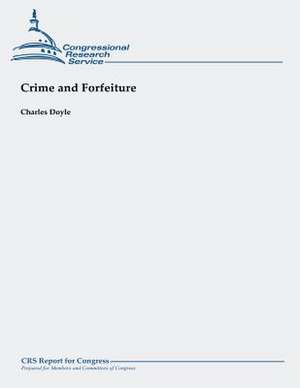Crime and Forfeiture
Autor Charles Doyleen Limba Engleză Paperback
| Toate formatele și edițiile | Preț | Express |
|---|---|---|
| Paperback (2) | 128.48 lei 3-5 săpt. | |
| CREATESPACE – | 128.48 lei 3-5 săpt. | |
| Nova Science Publishers Inc – 30 sep 2008 | 292.31 lei 3-5 săpt. |
Preț: 128.48 lei
Nou
Puncte Express: 193
Preț estimativ în valută:
24.59€ • 26.29$ • 20.50£
24.59€ • 26.29$ • 20.50£
Carte disponibilă
Livrare economică 27 martie-10 aprilie
Preluare comenzi: 021 569.72.76
Specificații
ISBN-13: 9781490957692
ISBN-10: 1490957693
Pagini: 96
Dimensiuni: 216 x 279 x 5 mm
Greutate: 0.25 kg
Editura: CREATESPACE
ISBN-10: 1490957693
Pagini: 96
Dimensiuni: 216 x 279 x 5 mm
Greutate: 0.25 kg
Editura: CREATESPACE
Cuprins
Preface; Introduction; Background; Modern Forfeiture Law; Property and Trigger Crimes; Civil Procedure; Criminal Procedure; Disposition of Forfeited Assets; Federal Funds; Constitutional Considerations; Eighth Amendment; Double Jeopardy; Sixth Amendment; Due Process; Article III; Fourth Amendment; First Amendment; Appendices; Federal Forfeiture Statutes; State Forfeiture Statutes; Index.
